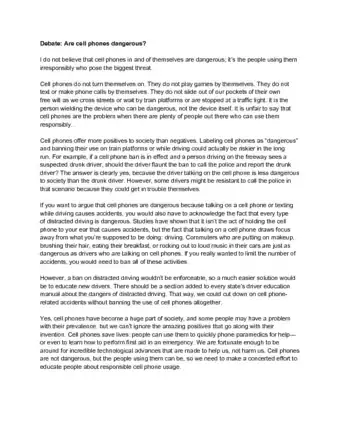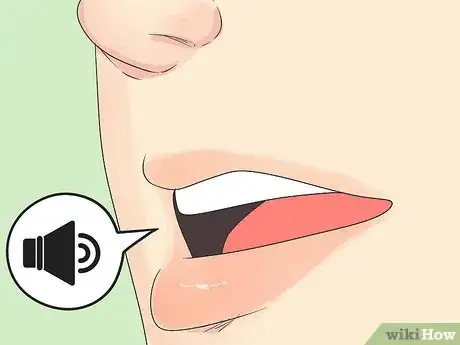wikiHow is a “wiki,” similar to Wikipedia, which means that many of our articles are co-written by multiple authors. To create this article, 60 people, some anonymous, worked to edit and improve it over time.
There are 16 references cited in this article, which can be found at the bottom of the page.
wikiHow marks an article as reader-approved once it receives enough positive feedback. This article received 26 testimonials and 84% of readers who voted found it helpful, earning it our reader-approved status.
This article has been viewed 319,799 times.
Learn more...
The art of debate requires skillful execution of many factors. Essentially, the core spirit of debated can be summed up in three primary factors: ethos (ethics), pathos (emotions), and logos (rationality).[1] [2] Developing your argument in terms of these will ensure you have foundation, but to win a debate, you'll have to keep in mind how you present yourself and refute the points of the opposition as well. Knowing what to look for and being prepared to execute can be the difference between a victory and defeat.
Steps
Sample Arguments
Preparing for a Debate
-
1Research your topic. You'll need to know the general details of the topic that you'll be expected to debate, but in particular, you should take note of specific information and figures you might use.[3] This will help with your rational appeal in your argument, as numbers can have a powerful impact in your audience while being difficult to refute.[4]
- Research in an open ended fashion to improve your critical evaluation of facts. Open ended research usually entails shifting your reading and viewing habits to include sources that are educational or current event based.
- Conduct focused research on your topic. List the areas you feel you have strong background knowledge and any gaps in your knowledge on the topic. Try to fill in these gaps while coordinating your research with other teammates, so there is little to no overlap in your research efforts and you make the best use of your time.
-
2Dress suitably for your debate. How you present yourself to your audience is often considered to be part of your delivery and will likely affect your scoring. Depending on the level of your competition and the expectations of those involved, the right outfit for your situation may vary. You will want to come across from the very beginning as being respectful of your audience and a respectable person, both of which can be achieved by wearing more formal clothing.
- Ask your teacher or coach what the best clothing for your level of competition might be if you are unsure.
- Lower level or less serious competitions might only require a dress shirt or polo with a pair of khaki pants.
- High level competitions, championships for example, will probably be best attended in a suit and tie.
- Don't overdress; although a tuxedo will set you apart, it might seem to others like you are showing off.
Advertisement -
3Write your speech. Once you have decided on your argument and the material you will use in it, you will need to write the speech you will use during the debate. Depending on the kind of debate and the rules your debate chapter, these can differ significantly, though every debate should have:[5]
- An unbiased introduction that presents basic information and the topic.
- A body that includes an emotional point, a logical point, and an ethical point in favor of your side of the debate. You should also have examples, quotations, and statistics to strengthen your case.
- A conclusion that summarizes the important points made by you and/or members of your team.[6]
-
4Rehearse your material. This is an important part of debate preparation.[7] Rehearsal will help you feel more comfortable with your material, will make you more aware of your voice and body, and will help you identify problem areas.[8]
- Record yourself if you are able. This way you can check your posture, gestures, and speaking volume.
- Try rehearsing in front of mirror. Note how you use your hands, how your words sync with your expressions, and the naturalness of your body language.
-
5Memorize your main points. Quick recall will allow you to respond to the oppositions points more quickly. Additionally, memorization will put information vital to your argument/counterargument at your disposal. Demonstrating your quick wit can earn you points with your judges and put you ahead of your opponents.
-
6Predict your opposition. While constructing your argument, you should take weak points into consideration, as these will likely be used by your opposition. Beyond that, what are the best arguments you can think to use for the opposing argument? Keep this in mind, and think of specific ways you can question or undermine the validity of these arguments.
-
7Make debate aids. Your level and the rules of your debate league might disallow the use of index cards during your debate, but these can still help you with memorization and organization. In the event that flashcards are allowed, these can help you keep your argument and rebuttals well organized and accurate.
- Organize your flashcards so that the most important information is offset from other details by using underlines, highlighting, or other marks.
- Include a bare-bones outline of your talking points so that if you are interrupted or lose your place, you can get back on topic easily.
- Study with your flashcards regularly. Choose intervals throughout the day to study, like after waking up, during lunch, and before going to bed. Repetition will help reinforce your memorization.[9]
-
8Get plenty of sleep. This can be especially difficult if you are a nervous person, but tension can result in even laid back debaters having a poor night's sleep. Sleep deprivation can hurt your response time, recall, and mental sharpness, which may translate into penalties in your score.[10] To prevent nerves from harming your sleep, you might:
- Exercise the day before a debate.
- Take a natural sleep supplement, like chamomile tea or melatonin, to help falling asleep.[11]
-
9Eat sufficiently before your debate. Most veteran speakers will prepare for a debate by eating moderate meals. Most eat enough to keep hunger at bay during the debate, but avoid eating anything heavy that might cause drowsiness or lethargy. You might also want to avoid consuming dairy, as doing so can create mucous that might hurt your speaking voice, and caffeinated beverages, which can cause an over-active bladder.
Performing During the Debate
-
1Speak in a clear voice. You will need to assess the environment in which the debate is held before you can know which speaking volume will be most effective. If there is a mic you are expected to use, you should check its volume before beginning your speech. Smaller rooms can benefit from a warm, conversational tone, while large presentation halls may require a louder than normal speaking voice.
-
2Adopt a suitable appearance. You will also be judged on how you integrate your body language with your speech.[12] Identify emotional shifts in your speech and match these with the appropriate posture and gestures. Three key aspects of your appearance are:
- Posture: avoid slouching or lazy posture, as these can be interpreted negatively. A straight-back, feet shoulder width apart, attentive but at ease stance will make it easy for you to transition to other gestures/postures throughout your speech.
- Gesture: make sure there is enough variety in your gestures; repetitive motions can hurt your score. Keep your gestures above the waist so that each can be easily seen.
- Eye contact: it is generally expected that you will have to consult notes for specific figures and certain points, but maintaining strong and consistent eye contact is expected throughout your debate. You should practice speaking and scanning your notes before your debate.[13]
-
3Take notes during the oppositions time. For you to properly refute inaccurate information, rebut a point, or address a counterargument, you will need to address specific points in your opposition's case. Check the other team's statistics against your own and jot down any information that seems false, incomplete, or mis-portrayed.
-
4Show your negative points in a positive light. Framing can drastically change the way information is interpreted by an audience, and if you have the last word, framing can be an effective tool to change a negative opinion to a positive one.[14] You may want to re-frame the obvious counterexamples that the opposition is likely to use, so that you have a strong refutation partially prepared.
- The point, "School uniforms restrict students' individuality," might be re-framed, "School uniforms prevent individuality from negatively impacting the learning of all students."
-
5Argue your proposition with conviction. For your proposition to be accepted, you will need to convince the jury that your plan (motion) is the way to go. This will require you to defend it against the opposition while making points in favor of your proposition.
-
6Meet the opposition requirements. Classically, debate has objectives that are considered strong proof of a superior argument. Though these can take many different forms, there are three customary ways to win a debate as the opposition:
- Prove that the problem solved by the motion does not exist.
- Prove that the motion proposed does not solve the problem.
- Prove that the motion is not the appropriate way to solve the problem and/or that the plan proposed brings more negative consequences than benefits.
-
7Bring a new point to attention. This is especially useful if you are the third speaker, as it can shift attention away from other, more important points you have raised. This can also return attention to the main thrust of your argument. However, you should not make any new arguments at this point, as this is oftentimes judged negatively. Though you are still allowed to attack or defend any argument from a new perspective.
-
8Rebut the opposition. Identify and take note of the key arguments of the other team. Unraveling these will earn you points in refutation and put the other team on the defensive. You will need to refute the arguments of the other side while rebuilding any of your own points. An effective way of doing this during the debate is to ask the following questions:
- Is the methodology of the other side flawed in some way?[15]
- Does the opposition make any claims that have factual, moral, or logical errors?
- Does the opposition make an assumptions or logical fallacies?
Addressing POIs (CNDF or National debate style)
-
1Know the rules for Points of Information. POIs can only be made during unprotected time which is usually defined as the time after the first and before the third minute of a speech.[16] A POI must be in question form, but aside from that it can be used for many different purposes.
- Some uses of POIs: clarification, disruption of someone’s speech, pointing out weaknesses, or to get an answer useful for your own argument.
- An example of using a POI for your argument might go something like: "After the second speaker of the proposition side accepted my POI, she admitted that..."
- In most competitive debate, POIs are limited to 15 seconds.
-
2Offer your POI with adherence to proper etiquette. To offer a POI, you should stand up holding one hand atop your head with the other in the air. As a speaker, you can either deny or accept a point of information. During a speech of 4 minutes, it is considered good form to accept at least two POIs, but at minimum you should try to address at least one.[17]
- Accept POIs by saying, "Yes," or "I'll take your point."
- Decline POIs by saying, "No thank you," or gently waving your hand downward to indicate an opponent should sit.[18]
-
3Counter counterarguments. You and your team should pay attention to the POIs brought up by your opponents. These can provide an early warning for the direction of the opposing team's arguments and rebuttals, as pointed questions in the form of POIs can reveal the oppositions depth of knowledge or lack thereof. Use this foreknowledge to prepare your defense.
- If one of the opposing team’s POIs references a specific study or authority, then you may want to consider what you know about that source. As you consider the source, think about how you can refute other points that your opposition might draw from that source.
-
4Be direct. Due to the 15 second time constraint of POIs, and the speaker's ability to cut the POI short, your POI should be motivated by a key principle or argument. The very first line of your POI should include your main point to prevent being cut off. Be sure you are prepared to move back into your speech after finishing your POI.
Community Q&A
-
QuestionWhat characteristics do I need to be a good debater?
 Community AnswerClear diction, loud voice, wit, and confidence. To be honest, anyone can become a good debater if they practice.
Community AnswerClear diction, loud voice, wit, and confidence. To be honest, anyone can become a good debater if they practice. -
QuestionWhat should I do if I forget my lines during the debate?
 Community AnswerDon't memorize your debate word-for-word. Instead, memorize key talking points and the evidence you have to back them up. This will give your debate a more natural presentation.
Community AnswerDon't memorize your debate word-for-word. Instead, memorize key talking points and the evidence you have to back them up. This will give your debate a more natural presentation. -
QuestionHow do I stop being nervous?
 Community AnswerSmile from time to time to feel more comfortable. If you can't look at people while you are talking without getting distracted or anxious, try to focus on a part of their face that's not their eyes. Keep referring to your notes, which are there to help you maintain your focus.
Community AnswerSmile from time to time to feel more comfortable. If you can't look at people while you are talking without getting distracted or anxious, try to focus on a part of their face that's not their eyes. Keep referring to your notes, which are there to help you maintain your focus.
References
- ↑ http://literacy.kent.edu/eureka/EDR/1/Write%20ArguingwithAristotle.pdf
- ↑ http://pathosethoslogos.com/
- ↑ http://writingcenter.unc.edu/handouts/statistics/
- ↑ http://writingcenter.unc.edu/handouts/statistics/
- ↑ http://www.csun.edu/~dgw61315/debformats.html
- ↑ https://noisyclassroom.com/oracy-ideas/five-steps-for-preparing-a-debate-with-a-class/
- ↑ http://www.abc.net.au/btn/resources/teacher/episode/20150526-debatingchampionships.pdf
- ↑ http://christopherwitt.com/the-benefits-of-rehearsing-a-speech-or-presentation/
- ↑ http://leah4sci.com/flashcards/
- ↑ https://www.sleepfoundation.org/sleep-deprivation
- ↑ https://www.hopkinsmedicine.org/health/wellness-and-prevention/natural-sleep-aids-home-remedies-to-help-you-sleep
- ↑ https://www.uiltexas.org/files/capitalconference/Grant-DEBATE_DRESS_CODE.pdf
- ↑ https://www.zenbusiness.com/blog/eyecontact/
- ↑ http://www.berkeley.edu/news/media/releases/2003/10/27_lakoff.shtml
- ↑ https://noisyclassroom.com/oracy-ideas/different-forms-of-rebuttal/
- ↑ http://highschooldebate.org/rules/
- ↑ http://highschooldebate.org/rules/
- ↑ http://highschooldebate.org/rules/
About This Article
To win a debate, take good notes when your opposition is speaking so you can refute any inaccuracies. During your refutation, try to reframe any negative points by offering more positive interpretations of them. Point out flaws in your opponent's methodology if you can. You can also highlight any points your opponent makes that are based on factual, moral, or logical errors. Finally, argue your own proposition with conviction, using examples, quotations, and statistics to strengthen your case. For information on addressing Points of Information to help you win a debate, read on!




















































































